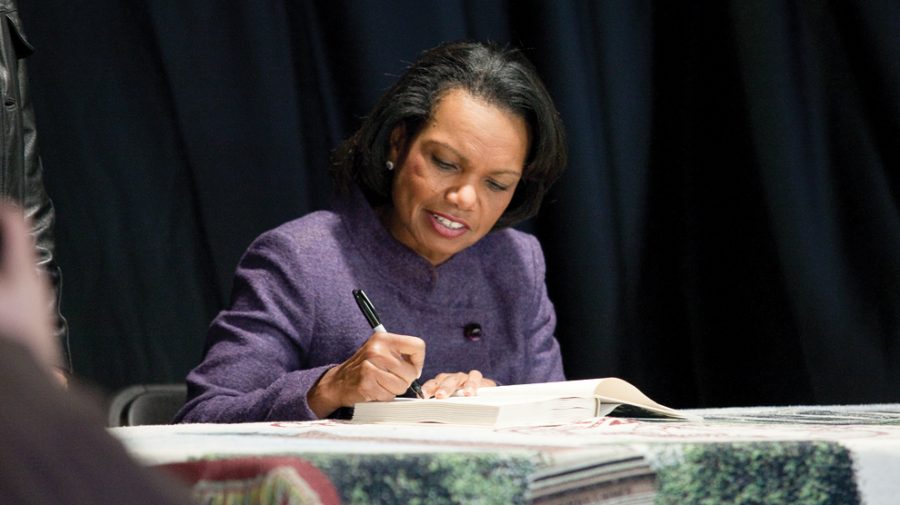?????Former U.S. Secretary of State Condoleezza Rice returned to her childhood home of Tuscaloosa Thursday to discuss her latest memoir, “Extraordinary, Ordinary People” in the Ferguson Center Theater.
“The title of the book really speaks to the two aspects of my family,” Rice said. “In an ordinary sense, my mother was a schoolteacher and my father a high school guidance counselor. What’s extraordinary is that they provided every educational opportunity to me. Education was a kind of armor against segregation.”
Despite the tough living conditions, Rice said her parents and fellow community members had the children convinced they could still be president one day.
Rice said the real challenge of writing the book was explaining the experiences from the perspective of a family, and particularly a child, and not the way the story has been told by civil rights activists before her.
“Right around 1962 and 1963, Birmingham came to be known as Bombingham,” she said. “It was a terrible time. We all suddenly realized that our parents couldn’t protect us anymore. I can vividly remember that my father sat out on our porch with a shotgun all night.”
In a press conference after her book signing at Foster Auditorium, she said the word “racist” is overused, prevents progress and acts as a virtual mute button in conversation today.
“Don’t rest on your laurels,” Rice said. “Turn the volume down on race, but keep the conversation going.”
Rice emphasized that race, creed or color should not be an issue at all, but mentioned that she has faced discrimination.
“Working hard allows us to push forward. Certainly sometimes people looked at me as a black woman,” Rice said regarding her stint on the national political scene. “But since I couldn’t recreate myself as a white man, I just kept pushing forward.”
Rice also talked about her time living in Tuscaloosa, after her family moved from Birmingham near the end of 1965.
“I remember I was furious when my family told me we were moving,” she said. “But my father wanted to become involved in a college, so we moved here and he became the dean of students at Stillman. It was really a wonderful environment.
“At the time, UA was still integrating, and many African Americans would come to Stillman to just walk around. It was really a safe environment.”
It was during their time at Stillman that Rice’s father began his lifelong friendship with John Blackburn, a former administrator at the University who is famous for helping peacefully integrate the school’s campus.
Rice told students in attendance to take economics courses while enrolled in college. She polled students in attendance, telling her audience to take at least three economics classes.
“The studying of economics is essential in understanding the international system,” she said. “You get more out of doing something that is difficult for you. Find a mentor, someone who opens up a new world to you. I love the moment when I can see in my student’s eyes that I’ve said something that intrigues them.”
In reference to her and President Bush’s silence towards the Obama administration, Rice said she understood the difficulty of the tasks they face.
“It’s a whole lot tougher in there than out here,” she said. “The media can sometimes make that tougher. If I have something to say, I’ll call them.”
Rice also addressed public opinion, and the difficulties she’s experienced, whether in public office or as provost at Stanford University.
“Today’s headlines and history’s judgments are rarely the same,” she said.
Rice said she has already begun writing her next book, in which she addresses the effects of Sept. 11, and would love to return to the University to speak about it.
After her talk in the Ferguson Center Theater, she signed copies of her latest novel inside the newly renovated Foster Auditorium from 1 to 2:30 p.m.









